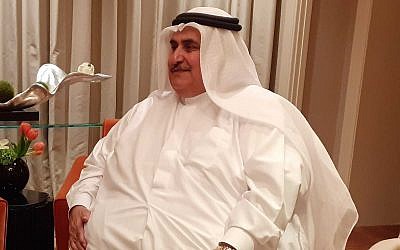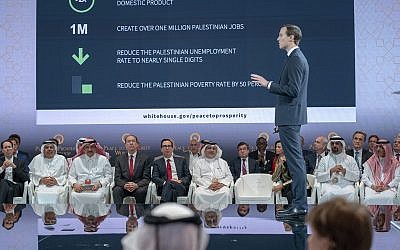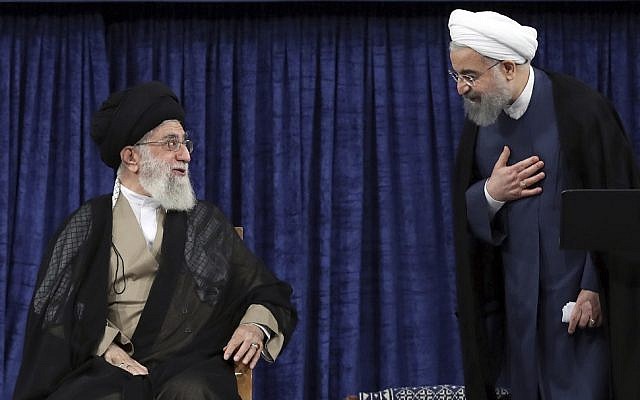Solomon2
BANNED

- Joined
- Dec 12, 2008
- Messages
- 19,475
- Reaction score
- -37
- Country
- Location
Bahraini FM: If not for Iran’s support of Hamas, we’d be closer to Mideast peace
Official in Palestinian terror group lambastes Khalid bin Ahmed Al Khalifa for photo with Israeli counterpart, says it shows ‘just how pro-Zionist some Arab officials have become’
By ADAM RASGON and TOI STAFF 20 July 2019, 1:06 pm
Official in Palestinian terror group lambastes Khalid bin Ahmed Al Khalifa for photo with Israeli counterpart, says it shows ‘just how pro-Zionist some Arab officials have become’
By ADAM RASGON and TOI STAFF 20 July 2019, 1:06 pm

- Bahraini Foreign Minister Khalid bin Ahmed Al Khalifa at the Atlantic Council in Washington, DC, July 17, 2019 (YouTube screenshot)
Bahraini Foreign Minister Khalid bin Ahmed Al Khalifa has said that if it were not for Iran’s support of Hamas and other armed groups in the Gaza Strip, Israel and the Palestinians would be nearer to peace.
Iran is a backer of the Izz ad-Din al-Qassam Brigades, the Hamas terror group’s armed wing, and the al-Quds Brigades, Islamic Jihad’s military branch.
“We don’t want to let this issue [of the Israeli-Palestinian conflict] continue to be used by countries or terror groups that seek dominance in the region. And that will bring us to the issue of Iran,” the top Bahraini diplomat said Wednesday at an Atlantic Council event in Washington, DC.
“If it wasn’t for Iran being present — Iranian soldiers, Iranian money, Iranian support for Hamas and jihadis that take control of Gaza — we would have been much closer to achieving a better peace between the Palestinians and Israelis and we would have a better chance,” he said. “But that role was so toxic that it would make things difficult every time.”

Foreign Minister Israel Katz and his Bahraini counterpart Khalid bin Ahmed Al-Khalifa (R) pose for a photograph at the State Department in Washington on July 17, 2019. (Courtesy)
Like Israel, Bahrain has long vociferously criticized Iran over its support for armed groups in the Middle East. Iran also supports the Houthi rebels in Yemen, the Popular Mobilization Units in Iraq and Syrian President Bashar Assad’s government.
The footage of the Bahraini foreign minister’s comments only surfaced on Friday, when the Atlantic Council posted them to its YouTube page.
Al Khalifa had also said his country was interested in future tourism and trade with the Jewish state, but added that it was “too early” to discuss such moves. “We want to get there.”
In a first this week, Al Khalifa posed for a photo with Israeli Foreign Minister Israel Katz. Israeli Prime Minister Benjamin Netanyahu has increasingly touted the country’s growing ties to Arab states through both open and clandestine channels. On Thursday, the Foreign Ministry even said Katz and Netanyahu were hoping to work towards peace agreements with Gulf nations in the coming years.

Bahraini Foreign Minister Khalid bin Ahmed Al Khalifa speaks with the Times of Israel on the sidelines of the Peace to Prosperity workshop in Manama, Bahrain, on June 26, 2019. (Courtesy)
But while Al Khalifa spoke of the Israeli people wanting and deserving “peace of mind in their lives and for the future generations,” he stressed that “as much as the Israelis have the right to their own country, the Palestinians have the right to their own country, on their own land.
“They have been there for millennia. And there’s no way that we ignore their right to belonging to that land,” he said.
Meanwhile, Hamas censured Al Khalifa for his photo with Katz.
“The warm photo of Bahrain and the occupation’s foreign ministers reflects just how pro-Zionist some Arab officials have become,” Hamas official Sami Abu Zuhri tweeted. “These meetings and photos are a betrayal of Jerusalem and Palestine and they will not succeed in undermining the consciousness of the nation or pushing it to give up on Palestine or normalizing the occupation.”
Jason Greenblatt, one of US President Donald Trump’s Middle East peace envoys, posted the photo to Twitter on Thursday and said the two foreign ministers took part in a “friendly exchange.”

Jason D. Greenblatt
✔@jdgreenblatt45
https://twitter.com/jdgreenblatt45/status/1151892005242527745
Terrific progress in Washington this week for Israel, Bahrain & the region - @Israel_katz & @khalidalkhalifa friendly exchange at the @StateDept Ministerial to Advance Religious Freedom
Katz said he and Al Khalifa “discussed Iran, regional threats and bilateral relations, and agreed to remain in contact.”
Israel and Bahrain do not maintain formal diplomatic relations. Both countries, however, have vociferously criticized Iran over its support for armed groups in a number of countries in the Middle East.
Hamas, an Islamist terror group that has vowed to destroy Israel, has urged Arab states against engagement or normalization with Israel.
In late June, Bahrain hosted an American-led workshop which focused on the economic portion of the US administration’s long-awaited proposal to resolve the Israeli-Palestinian conflict.

US Treasury Secretary Steven Mnuchin, fifth from left, and Bahrain Crown Prince Salman bin Hamad Al Khalifa, sixth from left, listen to White House senior adviser Jared Kushner, standing, during the opening session of the ‘Peace to Prosperity’ workshop in Manama, Bahrain on June 25, 2019. (Bahrain News Agency via AP)
While no Israeli officials attended the summit in Manama, a number of Israeli businessmen and journalists did so.
Hamas and the Ramallah-based Palestinian leadership fiercely opposed the conference in the Bahraini capital.
The Palestine Liberation Organization asserted that the conference’s economic focus sought to undermine its aspirations for statehood. It also accused the US of attempting to use the gathering to normalize Israel’s status in the Arab world.
In an interview with The Times of Israel on the sidelines of the summit, Al Khalifa expressed hope for better relations and eventually “peace” with Israel — a country he nonchalantly declared a part of the region and “there to stay.”
















